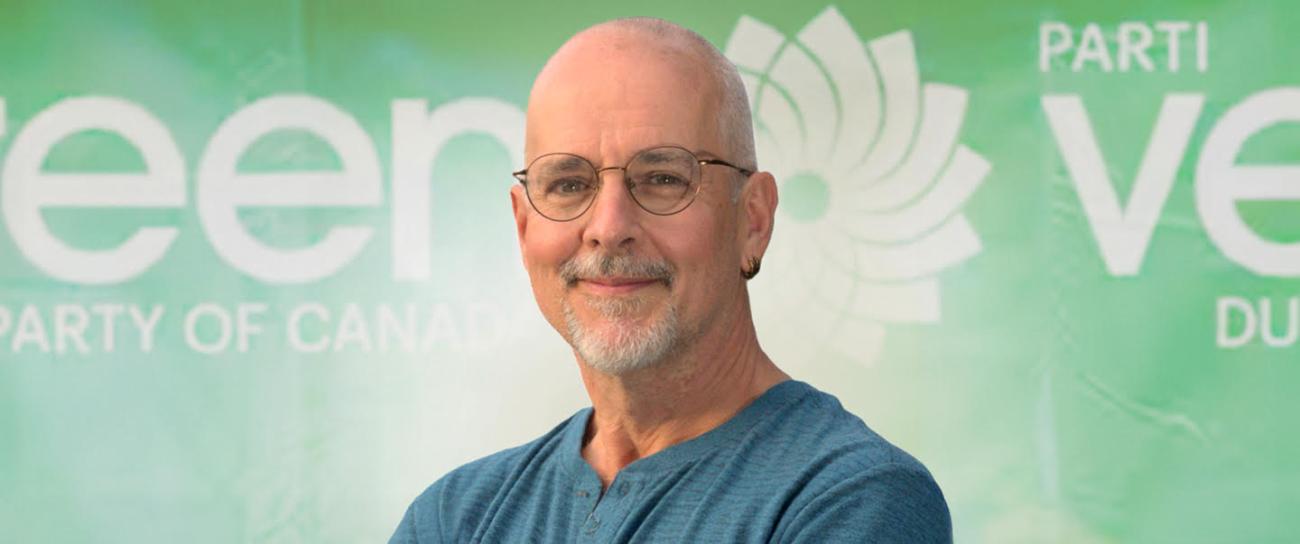Canada is heading to the polls on April 28 after a snap spring election was called by Prime Minister Mark Carney at the end of March. With campaigning already underway and election signs popping up on roadsides and our neighbours’ lawns, we reached out to the local candidates who will be appearing on the ballot in Provencher.
The Green Party of Canada is being represented in Provencher this election by Blair Mahaffy, who lived for many years with is family in Lorette. He now makes his home in West Hawk Lake. He’s both a software developer and riding guide at the Falcon Beach horse stables.
Mahaffy says that his loyalties used to lie with the Conservatives. When the Reform Party rose to prominence under Preston Manning in the 1990s, he shifted his allegiance to them.
In later years, Mahaffy felt drawn to the Greens.
“I liked Preston’s approach to democracy,” says Mahaffy. “You know, the elected Senate, the right of recall, those kinds of ideas. And that led me to learning about proportional representation.”
For Mahaffy, democratic reform has long been a driving passion, so much so that he was integral in the founding of Fair Vote Manitoba, an affiliate of Fair Vote Canada, which advocates for proportional representation in government.
In brief, proportional representation guarantees that a party will hold the number of seats in Parliament that are directly proportional to the number of votes they receive. So if the Green Party were to garner 10 percent of Canada’s votes, they’d hold 10 percent of the 334 seats in the House of Commons.
“More importantly, if 40 percent of the population vote for the Conservatives or Liberals, they would get 40 percent of the seats,” Mahaffy says. “Not 100 percent of the power, like it is right now.”
But Canada’s electoral system is based on a first-past-the-post model which allows the winner to take all.
Former Prime Minister Justin Trudeau made electoral reform one of his leading campaign platforms in the 2015 election. Once elected, the Liberals appointed an all-party parliamentary committee to review a number of systems, including proportional representation.
A thorough report was released in December 2016, but the Trudeau government failed to follow through. The first-past-the-post system remains in place to this day.
In his resignation speech in January, Trudeau admitted that not following through on electoral reform was one of his greatest leadership regrets.
According to Mahaffy, most European countries use proportional representation in their electoral systems, as well as New Zealand.
“New Zealand is a Westminster Parliament, just like Canada,” says Mahaffy. “Quite a number of years ago, that government said, ‘We’re going to try proportional representation for two election cycles and then have a referendum. When that referendum came up, [New Zealanders were] overwhelmingly in support of keeping the proportional representation.”
Beyond electoral reform, Mahaffy says that the Greens put a strong emphasis on sustainability. Social justice is a big part of that, which includes finding ways to create affordable housing for Canadians.
“There’s a huge inequity in our culture where the rich own so much, making it harder for people to get ahead. It doesn’t matter how hard they work. If they can’t afford rent and food, that’s a problem.”
For this reason, the Green Party just announced a plan to push for the elimination of income taxes for any Canadian earning under $40,000 per year. Mahaffy says that represents a shocking one-third of the population.
Putting these tax dollars back in the hands of lower-income earners inevitably allows it to flow back into the economy via greater spending ability, which would benefit all Canadians.
The Green Party has announced strategies to address affordable housing, such as the question of foreign property ownership.
“It’s a big problem all across Canada,” says Mahaffy. “My mom and dad’s assisted living place in Winnipeg is owned by a Saudi Arabian company. When you’ve got these massive corporations just taking profits, who are they [answerable] to?”
He says immigration policies also need some restructuring to ensure that social systems remain intact for Canadians.
Like income tax elimination, Mahaffy and his party are also proponents of the guaranteed liveable basic income, which would see a complete revamping of Canada’s health and income supports, making them more equitable for all while reducing administrative waste.
Of course, building sustainability in Canada has never been more important than it is right now in the face of shaky trade relations with our neighbours to the south.
“There’s a lot of talk about building pipelines to deal with the American challenge, but I think that’s the wrong direction. Let’s build renewable energy across Canada because Europe and China are going to take off ahead of us in renewables and we are going to be left behind.”
Mahaffy says that Canada should be amping up its position as leaders in the field of scientific research. As well, we should work towards gaining independence from our reliance on American military might.
Bringing the election closer to home, Mahaffy is all too aware that he is running a tough campaign in a Conservative stronghold. When asked why he’s okay with representing a party that likely won’t win, he thinks of the words of Green Party co-leader Elizabeth May.
“Every time another party steals an idea of ours, we’ve won. Because the Green Party, to some degree, is an activist party. We want to bring new ideas to the table… and we want to give people another option.”


